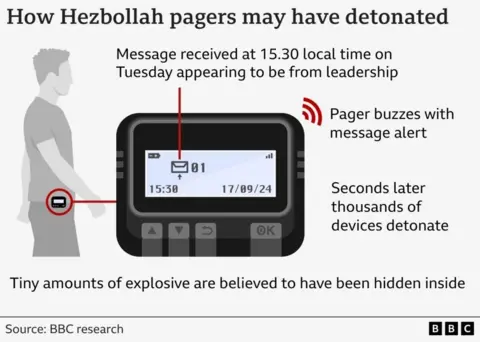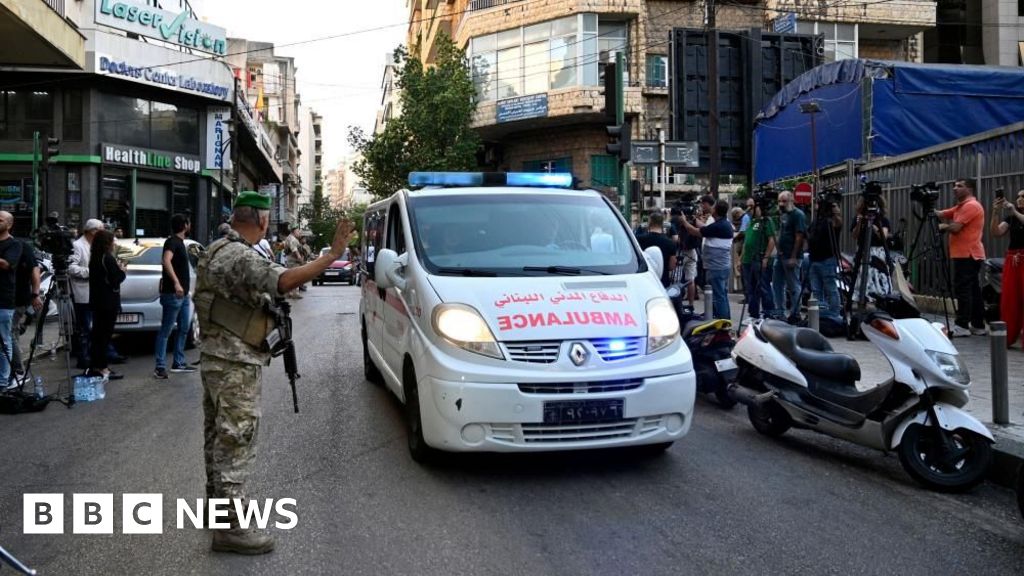 EPA
EPAAfter thousands of pagers and radio devices exploded in two separate incidents in Lebanon – injuring thousands of people and killing at least 37 – details are still being pieced together as to how such an operation was carried out.
Lebanon and Hezbollah, whose members and communication systems were targeted, have blamed Israel – though Israel is yet to comment.
The BBC has followed a trail from Taiwan, to Japan, Hungary, Israel and back to Lebanon.
Here are the unanswered questions.
How were the pagers compromised?
Some early speculation suggested that the pagers could have been targeted by a complex hack that caused them to explode. But that theory was quickly dismissed by experts.
To cause damage on the scale that they did, it is probable they were rigged with explosives before they entered Hezbollah’s possession, experts say.
Images of the broken remains of the pagers show the logo of a small Taiwanese electronics manufacturer: Gold Apollo.
The BBC visited the company’s offices, situated on a large business park in a nondescript suburb of Taipei.
The company’s founder, Hsu Ching-Kuang, seemed shocked. He denied the business had anything to do with the operation.
“You look at the pictures from Lebanon,” he told reporters outside his firm’s offices. “They don’t have any mark saying Made in Taiwan on them, we did not make those pagers!”
Instead – he pointed to a Hungarian company: BAC Consulting.
Mr Hsu said that three years ago he had licensed Gold Apollo’s trademark to BAC, allowing them to use Gold Apollo’s name on their own pagers.
He said the money transfers from BAC had been “very strange” – and that there had been problems with the payments, which had come from the Middle East.
What did a Hungarian company have to do with it?
The BBC went to the registered office of BAC Consulting, situated in a residential area of the Hungarian capital, Budapest.
The address appeared to be shared by 12 other companies – and no-one in the building could tell us anything about BAC Consulting at all.
Officials in Hungary say the firm, which was first incorporated in 2022, was merely a “trading intermediary with no manufacturing or operational site” in the country.
A brochure for BAC, published on LinkedIn, lists eight organisations it claims to have worked with – including the UK Department for International Development (DfID).
The UK Foreign Office – which has taken on DfID’s responsibilities – told the BBC it was in the process of investigating. But based on initial conversations, it said it did not have any involvement with BAC.
BAC’s website listed one person as its chief executive and founder – Cristiana Bársony-Arcidiacono.
The BBC made several attempts to contact Ms Bársony-Arcidiacono, but were unable to reach her.
However, she did reportedly speak to NBC News, saying: “I don’t make the pagers. I am just the intermediate.”
So who is really behind BAC Consulting?
The New York Times has reported that the company was in fact a front for Israeli intelligence.
The newspaper, citing three Israeli officials, said that two other shell companies were created to help hide the identities of the people who were really producing the pagers: Israeli intelligence officers.
The BBC has not been able to independently verify these reports – but we do know that Bulgarian authorities have now begun investigating another company linked to BAC.
Bulgarian broadcaster bTV reported on Thursday that 1.6 million euros ($1.8m; £1.3m) connected to the device attacks in Lebanon passed through Bulgaria and was later sent to Hungary.
How were the radio devices compromised?
The origins of the radio devices, which exploded in the second wave of attacks, are less clear.
We know that at least some of those that exploded were the IC-V82 model produced by the Japanese company, ICOM.
Those devices were purchased by Hezbollah five months ago, according to a security source speaking to Reuters news agency.
Earlier, a sales executive at the US subsidiary of Icom told rhe Associated Press news agency that the exploded radio devices in Lebanon appeared to be knockoff products that were not made by the company – adding that it was easy to find counterfeit versions online.
It took the BBC a matter of seconds to find Icom IC-V82s listed for sale in online marketplaces.
ICOM said in a statement it had stopped manufacturing and selling the model almost a decade ago, in October 2014 – and said it had also discontinued production of the batteries needed to operate it.
The company said it does not outsource manufacturing overseas – and all its radios are produced at a factory in Western Japan.
According to Kyodo news agency, Icom director Yoshiki Enomoyo suggested that photos of the damage around the battery compartment of the exploded walkie-talkies suggest they may have been retrofitted with explosives.
How were the devices detonated?
Videos show victims reaching into their pockets in the seconds before the devices detonated, causing chaos in streets, shops and homes across the country.
Lebanese authorities have concluded that the devices were detonated by “electronic messages” sent to them, according to a letter by the Lebanese mission to the UN, seen by Reuters news agency.
Citing US officials, the New York Times said that the pagers received messages that appeared to be coming from Hezbollah’s leadership before detonating. The messages instead appeared to trigger the devices, the outlet reported.
We do not yet know what kind of message was sent to the radio devices.

Have other devices been sabotaged?
This is the question many in Lebanon are now asking – paranoid that other devices, cameras, phones or laptops could have also been rigged with explosives.
The Lebanese Army has been on the streets of Beirut using a remote-controlled bomb disposal robot to carry out controlled explosions.
BBC crews in Lebanon have been stopped and told to not use their phones or cameras.
“Everyone is just panicking… We don’t know if we can stay next to our laptops, our phones. Everything seems like a danger at this point, and no-one knows what to do,” one woman, Ghida, told a BBC correspondent.
Why did the attack happen now?
There are several theories as to why the devices were triggered to explode this week.
One is that Israel chose this moment to send a devastating message to Hezbollah, following almost a year of escalating cross-border hostilities after Hezbollah fired rockets at or around northern Israel a day after the Hamas attack of 7 October.
The other is that Israel did not intend to put its plan in motion at this moment, but was forced to after fearing the plot was about to be exposed.
According to US outlet Axios, the original plan was for the pager attack to be the opening salvo of an all-out war as a way to try to cripple Hezbollah’s fighters.
But, it says, after Israel learned that Hezbollah had become suspicious, it chose to carry out the attack early.


